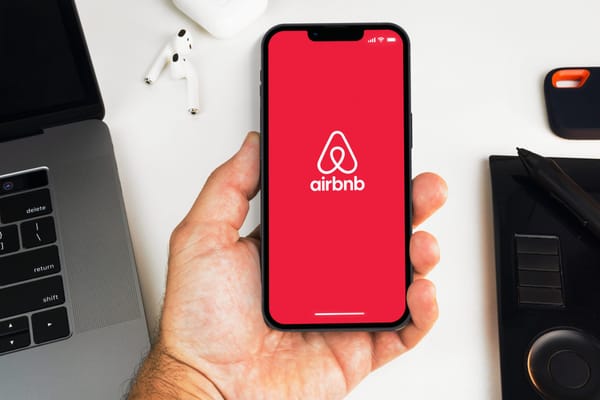Airbnb Hosting Tips from Experienced Hosts

Picture two Airbnb listings on the same street. One is fully booked, with guests leaving stellar reviews on the Airbnb platform, netting substantial income for the owner. The other apartment sits empty half the time, relying on discounts as the primary way to attract guests. Low prices create a vicious cycle and sometimes attract the wrong guests.
What does a successful Airbnb host do right that the other doesn't? We analyzed feedback from hosts to understand what works today in the vacation rental industry. Find out about Airbnb hosting tips that make Airbnb guests choose your listing while you build a lucrative business.

Tips That Successful Hosts Share with Beginners
Spending time in Airbnb communities and talking with hosts provided us first-hand insights into how experienced hosts think about the Airbnb business. We talked with hosts and gathered advice seasoned hosts like to share with newbies.
This is what they say:
1. Focus on the Guest Experience
To create the ideal guest experience, imagine yourself in their shoes for a moment. Experience is all about the details. As one seasoned host shared: "We offer a generous late check-out on Sundays. While most guests don’t take advantage of it, they still appreciate having the option."
Small touches and thoughtful gestures can make an impression on guests, even if they don’t end up needing the things.
Top Tip: An Airbnb Welcome Book is a fantastic way to make your guests feel welcome.
2. Find Your Unique Angle
A cookie-cutter approach often doesn't bring satisfactory results. Hosts emphasize the importance of standing out, whether through amenities, design, or location. One successful host in the Wyoming mountain area highlighted how their lodge look, rustic log furniture, and bison and bear themes attracted city dwellers looking for an escape. Guests aren’t just renting a space—they’re looking for an experience.
Top Tip: Pet-friendly stays, luxury spa-like retreats, eco-friendly cabins—whatever your niche may be, it sets you apart from the competition. In the same way, picking a theme that ties into the local vibe and matches what guests imagine for the destination can work, too.
3. Location Determines Success
A profitable location is a factor influencing Airbnb income, but it is not the only one. You also have to balance costs with demand. If mortgage, taxes, utilities, and service fees are too high, even a fully booked calendar might not cover your expenses. Some investors believe, “You make money when you buy, not when you sell.” The same logic applies when launching an STR: buy wisely, considering local competition, expenses and future growth.
Top Tip: Use data to assess occupancy rates and nightly rates in potential areas before investing. Platforms like AirDNA and Mashvisor can provide insights.
4. Don’t Just Compete—Create Opportunities
One host swears this strategy: "Go where others are not looking." Instead of competing with thousands of similar listings, find gaps in the market and fill them. Offer something competitors don’t, whether it’s flexible check-in, unique décor, or a hard-to-find amenity.
Top Tip: Use an Excel sheet to compare competitors’ rates, amenities, and cancellation policies. Find ways to differentiate your offering to attract loyal guests.
5. Guest Communication is Everything
Many hosts wish they had prioritized guest communication from day one. "Swift, friendly responses build trust," one seasoned host shared. "It sets a positive tone for the entire stay and often leads to glowing positive reviews."
Top Tip: Invest in a property management system early on to automate and manage guest communication efficiently. PMS and automation tools like iGMS can help streamline check-ins, messaging, and reviews.
6. Laundry and Cleaning Strategies Matter
Laundry is an unexpected nightmare for new hosts. Some hosts complain how the amount of work and stain removal is "insane." Of course, if you have cleaners, they will take care of it.
For a one-month stay, guests can choose if they’d like a weekly refresh for things like sheets and towels, even cleaning check-ups. Some hosts suggest finding a pickup and delivery laundry service in your area and provide to the guests, at their cost.
Top Tip: You can always ask them if they would like a refresh, but notify them if you're going to charge an additional cleaning fee.
7. Be Transparent in Your Listing
"Paint a crystal-clear picture of what to expect in your listing," one host advised. The more transparent you are, the less likely guests will be surprised or disappointed. Detailed descriptions help attract the right guests and prevent mismatched expectations.
On top of that, professional photos are your secret weapon: they'll make your property pop and turn browsers into bookers.
Top Tip: Clearly list all amenities, rules, and potential inconveniences. Spell everything out to minimize complaints. A "fully equipped kitchen" is a vague term, list all amenities you have: stove, oven, untensilis...
8. Technology is Your Friend
From channel managers to dynamic pricing tools, tech plays a huge role in STR success. One experienced host noted, "It’s a constant learning curve. More and more platforms to master as you grow." Adding Vrbo, Booking.com, and other platforms requires a channel manager to avoid overlapping dates.
Top Tip: A vacation rental software like iGMS provides a channel manager. You can also get a smart lock system for easy access management. Dynamic pricing tools are available for more advanced pricing strategies.
9. You Can’t Please Everyone
Even with over 700 five-star reviews, one host received a three-star review from a guest. "No matter what you do, some people just won’t be satisfied", she commented. Accept that some reviews might be unfair, but focus on delivering quality experiences for the majority.
Top Tip: Respond to negative guest reviews professionally, but don’t dwell on them. Keep improving based on constructive feedback.

Airbnb Hosting Tips on Market Research
Let's understand better how market research is related to vacation rental success.
Analyze Historic Demand in Local Area
Market trends can be identified and even predicted. First off, hosts need to determine what drives demand in their area. What are guests searching for? Is it proximity to local attractions, or does it serve as the perfect weekend getaway?
On Airbnb, anyone can track the historical performance of listings to establish benchmarks. While this can be done manually, tools like AirDNA, Airbtics, or Mashvisor can perform market research. Equip yourself with knowledge about the local market: occupancy rates, nightly rates, cancellation policies, average length of stay, and fluctuations in demand over weeks and months.
How Does the 80/20 Rule Apply to Airbnb?
When conducting market research, be mindful that average figures often hide things from our sight. Specifically, market performance tends to be imbalanced. In economics, the Pareto Principle, also known as the 80/20 rule, suggests that 80% of results stem from 20% of inputs. Applied to Airbnb, this could mean:
- 80% of revenue often comes from 20% of your bookings—repeat guests, long-term stays, or peak season rentals.
- 20% of listings dominate the market.
- 20% of dates generate 80% of your income.
- 20% of locations attract 80% of travelers.
What does this tell us? Market demand and revenue are far from evenly distributed. Some listings thrive while others struggle, and successful hosts often capitalize on critical demand drivers such as prime locations, peak seasons, or standout amenities.
Don’t take the 80/20 rule at face value, but don’t depend on general averages, either. Instead, observe the strategies of top-performing hosts. Pinpoint high-demand booking periods and adjust your pricing and listing to attract the ideal guests.
Airbnb Hosting Tips for Providing the Best Guest Experience
How do you meet guest expectations as a host? Here are some key insights, practical tips and tricks to lift your guest experience and make your Airbnb listing a top choice.
Gaining Superhost Status and Guest Favourite Badge
Airbnb uses a system of badges awarded to a select number of hosts. Specifically, these include the Superhost status and the Guest Favorite badge. Both significantly increase impression rates and click-through rates on the Airbnb platform, and both are closely tied to guest feedback and overall experience.
Superhost status is awarded to hosts who consistently provide outstanding hospitality over a quarterly evaluation period. It means that Airbnb sees a great host as one who:
- Have at least 10 stays or 3 long-term stays (over 100 nights in total) within the past 12 months.
- Maintain a 4.8+ average rating
- Have a cancellation rate below 1%
- Maintain a 90%+ response rate to guest messages.
The Guest Favorite badge is listing-specific and based purely on recent guest feedback.
- Guests must have positive, memorable experiences at your property
- A track record of high ratings, glowing reviews, and minimal complaints.
- You don't need to be a Superhost to get this badge.
By focusing on the quality of the guest's stay, you should be able to get one or both of these badges.
Agreeing on House Rules
Writing down house rules and having guests agree to them beforehand serves you in several ways. The most important reason is setting expectations, ensuring you and your guests are on the same page, and preventing potential issues.
Most hosts report that they keep their rules simple, typically including:
- No parties
- No smoking
- No pets (if applicable)
- Trash management
- Check-in/check-out instructions
You might add a couple of additional rules. However, making house rules too lengthy will confuse guests, reduce the likelihood they'll read them, and create a sense of micromanagement—which is not what you want.
That said, you may consider including policies on noise levels, additional guests, or proper use of amenities—especially if you offer features like a hot tub or shared spaces.

Airbnb Hosting Tips on Managing Guest Turnover
Turnover of Airbnb guests can be a hassle if a host isn't well-organized. Here are some tips on how to manage guest turnover more efficiently.
Have a Cleaning Checklist
Maintaining a clean and welcoming space requires a reliable cleaning service. Whether you’re handling it yourself or hiring professionals, the most effective approach is to use a cleaning checklist.
A cleaning checklist standardizes the cleaning process. If you’re working with a cleaning team, it helps clearly outline expectations and ensures consistent quality. You might also consider using a task management app like iGMS to track turnovers and assign tasks.
Pro Tip: Take videos or photos after each turnover. These will be invaluable if you need to file a claim with the Airbnb Resolution Center.
Create a Smooth Check-in and Check-out Process
To make sure the check-in and check-out process goes smoothly, follow this checklist:
- Communication Before Arrival – Send guests all necessary details in advance, including check-in instructions, key codes, Wi-Fi info, and parking details.
- Self-Check-In – A smart lock or lockbox allows flexible arrivals, reducing the risk of late check-in issues.
- Simple Check-Out Instructions – Keep check-out steps minimal and clear.
- Automate Reminders – Use Airbnb’s messaging system or a guest messaging app like iGMS to send automated check-in and check-out reminders.
- Fast Response to Questions – Be available to assist if guests run into issues during check-in or check-out.
Hire a Co-host
For hosts seeking passive income while avoiding hands-on involvement, hiring a co-host can be a great option.
In the market, there are currently two types of co-hosts:
- Virtual co-hosts
- On-site co-hosts
While it might seem counterintuitive to some hosts to hire a virtual co-host, they are available and offer services such as:
- Communicating with guests before and during their stay
- Coordinating cleaning and maintenance services
- Managing property listings
- Ensuring guests have a comfortable and enjoyable stay
A virtual co-host or assistant is ideal for fully automated Airbnbs equipped with smart locks, automation systems, reliable cleaners, and low-maintenance needs.
An on-site co-host, on the other hand, is a local who can:
- Personally manages turnovers
- Checks on the property
- Handles guest issues in person
They may also greet guests, restock supplies, and inspect the property between stays.
On-site co-hosts typically charge more than virtual co-hosts but provide a higher level of direct involvement.

Airbnb Hosting Tips on Pricing Strategy
Pricing strategy is an important part of listing management. Pricing should be approached strategically. One of the major steps for hosts is ditching static pricing and embracing a dynamic pricing strategy.
Peak Season Pricing
Vacation rentals typically have a peak season and a slow season. The million-dollar question is: how can you generate considerable income during the slow season?
One approach is to adjust pricing. Lower your nightly rates to fill vacancies during the slow season, and raise them during the peak season to capture increased demand.
One host shared a creative strategy for managing slower seasons. She adjusts her listing based on the time of year. During slower months like spring and fall, she locks the extra bedrooms and rents the property as a smaller space at a lower price. This strategy attracts couples, retirees, and small families who tend to travel more during off-season. By doing this, her property still gets booked, covers expenses, and keeps her cleaner employed.
Price adjustments can also be automated using tools like Beyond, PriceLabs, or Wheelhouse. These tools analyze real-time data, including competitor pricing, local events, booking trends, and supply-and-demand fluctuations, using complex algorithms to calculate optimal rates.
The advantage of these tools lies in their ability to fine-tune pricing on a micro level—adjusting rates weekly, monthly, or even daily in response to shifts in demand.
Offering Discounts
On the Airbnb website, hosts have options to offer discounts. The most common types of discounts are:
- Weekly Discount
This discount is automatically applied to guests who book for 7 or more nights. It incentivizes longer stays and helps hosts secure bookings for a longer period. The percentage discount is customizable by the host.
- Monthly Discount
For guests booking a stay of 28 nights or more, this discount can be set by the host to encourage longer-term reservations. It’s ideal for people looking for temporary housing, like remote workers, business travelers, travelling nurses, or those between homes.
- Early Bird Discount
Hosts can offer a discount to guests who book well in advance. This encourages guests to commit to a reservation early and secures bookings before peak season or holidays.
- Last-Minute Discount
This discount is designed for guests who book closer to their arrival date. It helps hosts fill vacancies during low-demand periods or if a listing has been left unbooked until the last minute.
- Length-of-Stay Discount
This type of discount applies to guests who book longer stays. It can be a flexible percentage, applied based on the duration of the stay.
Other than offering discounts on the platform, you could attract visitors to your direct booking website through other marketing channels. This allows you to avoid platform fees and incentivizes future guests to book directly with you, thanks to lower prices.
Airbnb Hosting Tips on Airbnb Regulations
Be up to date with rules and regulations regarding Airbnb in your local area or city.
Stay up to date on Rules and Local Laws
Before listing your property on Airbnb, make sure you understand the legal requirements in your area. Zoning laws determine whether short-term rentals are allowed in residential areas, and some cities restrict or ban them altogether. You may also need permits and licenses to operate legally, such as a short-term rental permit or a business license.
Airbnb hosts must collect and pay taxes and fees, including occupancy or lodging taxes. Some areas require hosts to handle this themselves, while in other states, Airbnb does it.
If your property is part of a Homeowners Association, check its rules. Many HOAs have strict policies against short-term rentals or require special approval.
Finally, ensure compliance with health and safety standards. This includes having smoke detectors, fire extinguishers, maybe carbon monoxide alarms, and proper emergency exits to ensure guest safety and meet local regulations.
90-day rule for Airbnb
Some cities don't ban Airbnb, but rather restrict it. The 90-day rule for Airbnb is a restriction that limits how many days per year a property can be rented as a short-term rental. Some cities, like San Francisco or Washington DC, enforce this rule.
Under this rule, a host can rent out their property for up to 90 days per year without needing a special permit. Once they hit the 90-day limit, they either have to stop accepting short-term bookings or apply for a long-term rental permit.
In many places with a 90-day rule, the restriction applies only to entire home rentals, meaning you may still be allowed to rent out a shared space (such as a private room while you remain in the home) even after reaching the 90-day limit.
And, you can rent out Airbnb on a monthly basis, as mid-term rentals require a long-term lease. That is how many hosts get around these strict rules.

Airbnb Hosting Tips on Vacation Rental Automation
Airbnb hosting is a lucrative source of income, but it is also time-consuming, especially when scaling up your operations. For example, you might start by renting out on Airbnb but later decide to introduce platforms like Vrbo and Booking.com to diversify and increase your income.
Managing reservations across multiple platforms involves blocking off dates manually on one platform every time you get a booking on another. In such cases, vacation rental software with a channel manager will handle this process automatically.
Another major time drain is responding to guest messages manually. To maintain Superhost status, you often need to respond to guests within one or two hours—practically instantly. It’s easy to see how this becomes overwhelming.
A message automation system helps by sending templated messages for check-in, pre-check-out reminders, and other events. You can customize these triggers anytime. This way, you still communicate with your guests, but only when necessary, while managing all conversations from a unified inbox.
Some Airbnb hosts hire a cleaner. In such cases, an automated system can assign tasks based on check-in and check-out dates, streamlining the process further.
If you're looking for less hassle and more control over your Airbnb listing, the vacation rental automation tool iGMS is worth it. Plus, iGMS offers additional features, such as a free direct booking website.






